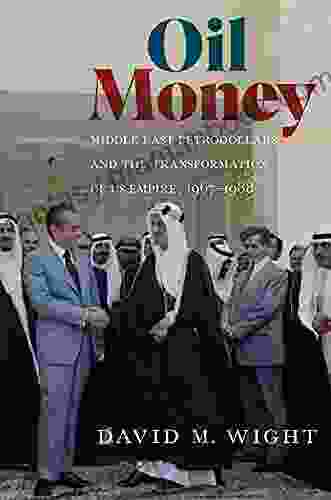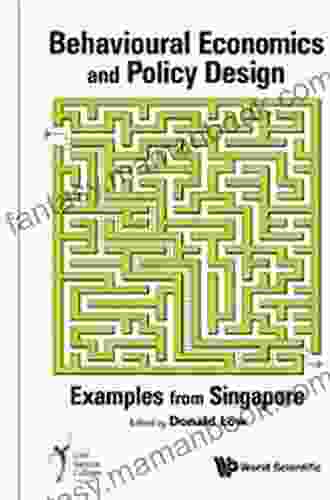Middle East Petrodollars and the Transformation of the US Empire, 1967-1988

The Middle East has been a pivotal region for global politics and economics for centuries. Its vast oil reserves have made it a key player in the world energy market, and its strategic location has made it a focal point for regional and international conflicts.
In the post-World War II era, the Middle East became increasingly important to the United States. As the US emerged as the world's dominant superpower, it sought to secure its access to Middle Eastern oil and to prevent the spread of Soviet influence in the region.
4 out of 5
| Language | : | English |
| File size | : | 15116 KB |
| Text-to-Speech | : | Enabled |
| Screen Reader | : | Supported |
| Enhanced typesetting | : | Enabled |
| Word Wise | : | Enabled |
| Print length | : | 356 pages |
The US's involvement in the Middle East deepened significantly after the 1967 Arab-Israeli War. The war led to a sharp increase in oil prices, which had a profound impact on the global economy. The US, which was heavily dependent on imported oil, was particularly hard hit by the price hikes.
In response to the oil crisis, the US government sought to strengthen its ties with Middle Eastern oil producers. The Nixon administration launched a series of initiatives designed to improve relations with the Arab states, including the sale of advanced weapons to Saudi Arabia and the establishment of a US-Saudi joint economic commission.
The US's relationship with the Middle East continued to evolve throughout the 1970s and 1980s. The Carter administration pursued a more balanced approach to the region, seeking to improve relations with both Israel and the Arab states. The Reagan administration, however, adopted a more pro-Israeli stance and became increasingly involved in the region's conflicts.
The US's involvement in the Middle East has had a profound impact on the region and on the world. The flow of petrodollars into the US has helped to fuel the country's economic growth and has also given the US considerable leverage in the region. However, the US's involvement has also led to increased tensions between the US and the Middle East, and has contributed to the outbreak of several wars.
The Oil Crisis of 1973
The oil crisis of 1973 was a major turning point in the history of the Middle East and its relationship with the United States. The crisis began in October 1973, when the Arab members of the Organization of Petroleum Exporting Countries (OPEC) announced an oil embargo against the United States and other countries that had supported Israel in the Yom Kippur War.
The oil embargo had a devastating impact on the global economy. The price of oil quadrupled, and there were severe shortages of gasoline and other petroleum products. The United States was particularly hard hit by the embargo, as it was heavily dependent on imported oil.
The oil crisis had a profound impact on the US economy. The price increases led to a sharp rise in inflation, and the shortages of gasoline and other petroleum products caused widespread disruptions. The crisis also led to a loss of confidence in the US government, as many Americans felt that the government had not done enough to prevent the crisis or to mitigate its effects.
The oil crisis also had a significant impact on the US's relationship with the Middle East. The Arab oil embargo made the US realize that it was vulnerable to disruptions in the flow of Middle Eastern oil. The US government began to take steps to reduce its dependence on imported oil, and it also sought to strengthen its ties with Middle Eastern oil producers.
The Rise of Petrodollars
The oil crisis of 1973 led to a sharp increase in the flow of petrodollars into the United States. Petrodollars are the US dollars that are earned by oil-exporting countries from the sale of their oil. The increase in oil prices meant that oil-exporting countries were earning more money, and much of this money was invested in the United States.
The flow of petrodollars into the United States had a significant impact on the US economy. The influx of capital helped to fuel the country's economic growth, and it also led to a decline in interest rates. The low interest rates made it easier for businesses to borrow money and invest, and this contributed to the economic boom of the 1980s.
However, the flow of petrodollars also had some negative consequences for the US economy. The influx of capital led to a rise in the value of the US dollar, which made it more expensive for US businesses to export their products. The high value of the dollar also made it more difficult for US manufacturers to compete with foreign competitors.
The US's Response to the Oil Crisis
The US government responded to the oil crisis of 1973 with a series of measures designed to reduce its dependence on imported oil and to strengthen its ties with Middle Eastern oil producers. The Nixon administration launched a series of initiatives designed to improve relations with the Arab states, including the sale of advanced weapons to Saudi Arabia and the establishment of a US-Saudi joint economic commission.
The Carter administration pursued a more balanced approach to the Middle East, seeking to improve relations with both Israel and the Arab states. The Reagan administration, however, adopted a more pro-Israeli stance and became increasingly involved in the region's conflicts.
The US's involvement in the Middle East has had a profound impact on the region and on the world. The flow of petrodollars into the US has helped to fuel the country's economic growth and has also given the US considerable leverage in the region. However, the US's involvement has also led to increased tensions between the US and the Middle East, and has contributed to the outbreak of several wars.
The Middle East has been a pivotal region for global politics and economics for centuries. Its vast oil reserves have made it a key player in the world energy market, and its strategic location has made it a focal point for regional and international conflicts.
The US's involvement in the Middle East deepened significantly after the 1967 Arab-Israeli War. The war led to a sharp increase in oil prices, which had a profound impact on the global economy. The US, which was heavily dependent on imported oil, was particularly hard hit by the price hikes.
In response to the oil crisis, the US government sought to strengthen its ties with Middle Eastern oil producers. The Nixon administration launched a series of initiatives designed to improve relations with the Arab states, including the sale of advanced weapons to Saudi Arabia and the establishment of a US-Saudi joint economic commission.
The US's relationship with the Middle East continued to evolve throughout the 1970s and 1980s. The Carter administration pursued a more balanced approach to the region, seeking to improve relations with both Israel and the Arab states. The Reagan administration, however, adopted a more pro-Israeli stance and became increasingly involved in the region's conflicts.
The US's involvement in the Middle East has had a profound impact on the region and on the world. The flow of petrodollars into the US has helped to fuel the country's economic growth and has also given the US considerable leverage in the region. However, the US's involvement has also led to increased tensions between the US and the Middle East, and has contributed to the outbreak of several wars.
4 out of 5
| Language | : | English |
| File size | : | 15116 KB |
| Text-to-Speech | : | Enabled |
| Screen Reader | : | Supported |
| Enhanced typesetting | : | Enabled |
| Word Wise | : | Enabled |
| Print length | : | 356 pages |
Do you want to contribute by writing guest posts on this blog?
Please contact us and send us a resume of previous articles that you have written.
 Top Book
Top Book Novel
Novel Fiction
Fiction Nonfiction
Nonfiction Literature
Literature Paperback
Paperback Hardcover
Hardcover E-book
E-book Audiobook
Audiobook Bestseller
Bestseller Classic
Classic Mystery
Mystery Thriller
Thriller Romance
Romance Fantasy
Fantasy Science Fiction
Science Fiction Biography
Biography Memoir
Memoir Autobiography
Autobiography Poetry
Poetry Drama
Drama Historical Fiction
Historical Fiction Self-help
Self-help Young Adult
Young Adult Childrens Books
Childrens Books Graphic Novel
Graphic Novel Anthology
Anthology Series
Series Encyclopedia
Encyclopedia Reference
Reference Guidebook
Guidebook Textbook
Textbook Workbook
Workbook Journal
Journal Diary
Diary Manuscript
Manuscript Folio
Folio Pulp Fiction
Pulp Fiction Short Stories
Short Stories Fairy Tales
Fairy Tales Fables
Fables Mythology
Mythology Philosophy
Philosophy Religion
Religion Spirituality
Spirituality Essays
Essays Critique
Critique Commentary
Commentary Glossary
Glossary Bibliography
Bibliography Index
Index Table of Contents
Table of Contents Preface
Preface Introduction
Introduction Foreword
Foreword Afterword
Afterword Appendices
Appendices Annotations
Annotations Footnotes
Footnotes Epilogue
Epilogue Prologue
Prologue Kimberley Kleczka
Kimberley Kleczka Julie Coe
Julie Coe Franco Arminio
Franco Arminio Finn Briscoe
Finn Briscoe Arthur C Clarke
Arthur C Clarke Gifty Metuge
Gifty Metuge Karen Ranney
Karen Ranney Sonia Pilcer
Sonia Pilcer Sophie Bartow
Sophie Bartow Jim Ewing
Jim Ewing Tabitha Gibson
Tabitha Gibson Mark Condon
Mark Condon Kathy Reichs
Kathy Reichs Dan Abnett
Dan Abnett Harry Stillwell Edwards
Harry Stillwell Edwards Robert Ward
Robert Ward Jun Mochizuki
Jun Mochizuki Peter Drinkell
Peter Drinkell Marco May
Marco May John Wilcox
John Wilcox
Light bulbAdvertise smarter! Our strategic ad space ensures maximum exposure. Reserve your spot today!

 Herb SimmonsTranslated By Nader Khalili Timeless Rumi: An Engaging Literary Exploration...
Herb SimmonsTranslated By Nader Khalili Timeless Rumi: An Engaging Literary Exploration...
 Ernest J. GainesRecipes and Wee Stories from the Scottish Islands: A Pride Month Gift from...
Ernest J. GainesRecipes and Wee Stories from the Scottish Islands: A Pride Month Gift from...
 August HayesMusic Metaphysics and the Twilight of the Russian Empire: Eurasia Past and...
August HayesMusic Metaphysics and the Twilight of the Russian Empire: Eurasia Past and...
 Jacob FosterAn Episode Under the Terror: A Riveting Tale of Starfleet's Encounter with...
Jacob FosterAn Episode Under the Terror: A Riveting Tale of Starfleet's Encounter with... Tyrone PowellFollow ·14.6k
Tyrone PowellFollow ·14.6k Gary CoxFollow ·10k
Gary CoxFollow ·10k Michael ChabonFollow ·3.8k
Michael ChabonFollow ·3.8k Adam HayesFollow ·14.6k
Adam HayesFollow ·14.6k Walter SimmonsFollow ·8.9k
Walter SimmonsFollow ·8.9k Hudson HayesFollow ·2k
Hudson HayesFollow ·2k Gerald ParkerFollow ·5.8k
Gerald ParkerFollow ·5.8k Griffin MitchellFollow ·13.8k
Griffin MitchellFollow ·13.8k

 Roland Hayes
Roland HayesFive Unique Eating Plans to Shatter Your Weight Loss...
Weight loss journeys can be a rollercoaster...

 Gustavo Cox
Gustavo CoxThe Small Habits Revolution: How Tiny Changes Can...
Are you ready to...

 Herman Mitchell
Herman MitchellVisit Alook Cool Place In Outer Space Let Explore The...
Welcome to the World Series...

 Hassan Cox
Hassan CoxGaunt's Ghosts Omnibus: A Comprehensive Guide to the Epic...
Prepare to embark on an...
4 out of 5
| Language | : | English |
| File size | : | 15116 KB |
| Text-to-Speech | : | Enabled |
| Screen Reader | : | Supported |
| Enhanced typesetting | : | Enabled |
| Word Wise | : | Enabled |
| Print length | : | 356 pages |








